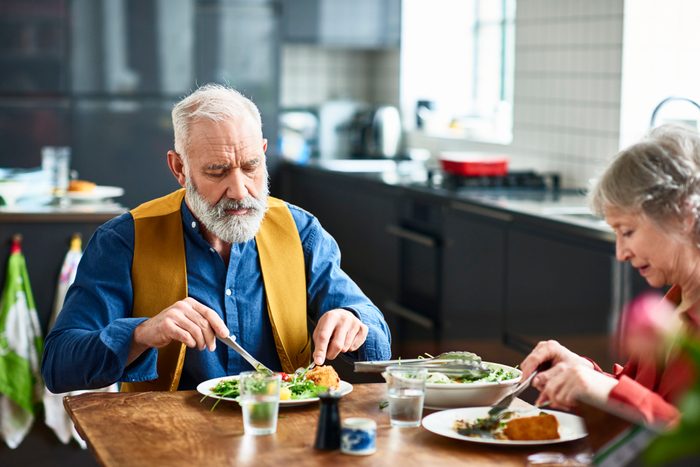
We can all think of at least one food that triggers digestive discomfort. Spicy curry can come with a side of heartburn, or maybe last night’s extra-cheesy pizza left you with more belly bloat than you bargained for. Even seemingly harmless foods like blackberries, scallions, and onions can cause gastrointestinal (G.I.) issues like gas. (For more, read 10 Surprising Foods That Can Cause Gas)
But interestingly, the foods you eat are just one aspect of digestion, explains Elizabeth Arensberg, MS, RD, LDN, a registered dietitian specializing in gut health. The physiological mechanics behind how you eat—from your body position to your state of mind—also influence how well your body processes food.
Arensberg and other experts share with their advice on how to be more mindful during meals to ease the most common digestion woes.
Live better every day—get The Healthy @Reader’s Digest newsletter

Have a seat
Dietitian Arensberg explains that intentionally sitting down for a meal puts your body in a relaxed state that encourages good digestion.
We all know: life gets busy, and a quick lunch while standing at the the kitchen counter isn’t unheard of. But, Arensberg says, by intentionally sitting down to eat, you initiate your senses—which triggers your brain and your gut to work together to release the digestive enzymes and acids needed to break down your food. “It also helps you better tune into your hunger and satiety cues,” she adds. A 2013 review of studies in The American Journal of Clinical Nutrition backed up this effect, finding that “attentive” eating helps to avoid overeating and better achieve weight-loss goals.
Sitting down and eating without distractions can also help you dine at a healthy pace, adds Sheila Rustgi, MD, gastroenterologist at ColumbiaDoctors and Assistant Professor of Medicine at Columbia University Medical Center. “When you eat fast, you swallow more air and fill your stomach faster—which can cause acid reflux and pain,” Dr. Rustgi says.
5 Ways Stress-Eating Impacts Your Gut Health, Mood, and More, Say Eating Psychology Specialists

Sit up straight
Slouching has quite a few negative knock-on effects in your body, and poor digestion is no exception. “Bad posture can squeeze the intestines and reduce their ability to function properly, resulting in unwanted symptoms like gas and bloating,” explains Raphael Kellman, MD, a Physician of Integrative and Functional Medicine.
Some research from over the years suggests the same. A 2003 study published in the journal Gut concluding that poor posture contributes to feeling backed up and gassy. “Poor posture has [also] been linked to a decreased ability to digest carbohydrates,” Dr. Kellman adds, which can provoke more bloating and increase your risk of irritable bowel syndrome (IBS) symptoms.

Take a few deep breaths
“In particular, diaphragmatic breathing—sitting and taking ten deep belly breaths—before meals can promote digestion and reduce esophageal pain,” Dr. Rustgi says.
Arensberg points out that this style of deep breathing stimulates your vagus nerve, which helps control your parasympathetic nervous system functions like breathing, immunity, and digestion. By taking a few big, slow breaths, you help your body transition into a state where it can better focus on breaking down food and absorbing its nutrients. (Fascinating!)
Follow The Healthy @Reader’s Digest on Facebook, Instagram, and Twitter

Slow down and really chew
“Surprisingly, most people only take a few bites of food before swallowing,” Arensberg says.
As a rule of thumb, she advises chewing food to an applesauce-like consistency. This increases the surface area for easier digestion while initiating the whole digestive process, which begins with the salivary enzymes in your mouth.
Rob Lowe Gets Candid about Fatherhood, Fitness, and the Diet That’s Been “a Very Good Fit”

Sip (don’t slug)
A long-standing study published in Clinical Nuclear Medicine verified that drinking liquids while you eat has no negative effect on digestion. In fact, water helps move food along your digestive tract, prevent constipation, and promote better nutrient absorption in your GI tract.
One pointer? Arensberg notes that if you’re prone to stomach discomfort, make sure that you’re well hydrated before a meal. Also aim to take smaller sips of fluids as you eat rather than chugging big gulps.
This Is the Healthiest Type of Fizzy Water, Say Doctors (and a Dentist)

Go for a walk
It’s not just our posture while we eat that’s important, Dr. Rutsgi says. “I generally recommend sitting upright for two hours after eating to avoid acid reflux,” she says, because reclining can encourage stomach acid to rise.
One solution is to go for a light walk after a meal, whether that means engaging in some light movement while you tidy the kitchen or going for a gentle stroll in your neighborhood. “This can actually aid in digestion and improve the absorption of the food you’ve just eaten,” Arensberg explains. A post-meal walk can also help control your blood sugar levels, according to a study published in Nutrients, and reduce feelings like bloating and gas, per research published in PLOS One.

Lie down on your left side
If you are experiencing indigestion post-meal, some sources suggest lying down on your left side may help ease discomfort.
More research on this is needed, but one study from The American Journal of Gastroenterology suggests sleeping on your right side can increase your likelihood of experiencing acid reflux. Though further evidence is mainly anecdotal, “the location of the stomach may give us a clue as to why people do report [that] laying on their left side aids with digestion,” Dr. Kellman says. Because the stomach is on the left side of the body, he says that this position may help encourage natural processes, aiding gravity to move waste efficiently through our system.
For some of us, lying on the left gives the sensation of putting pressure on the heart. If your digestive problems are a nuisance, or before you make any significant change to your wellness routine, it’s always best to speak with your licensed healthcare practitioner.
Get more of The Healthy:
